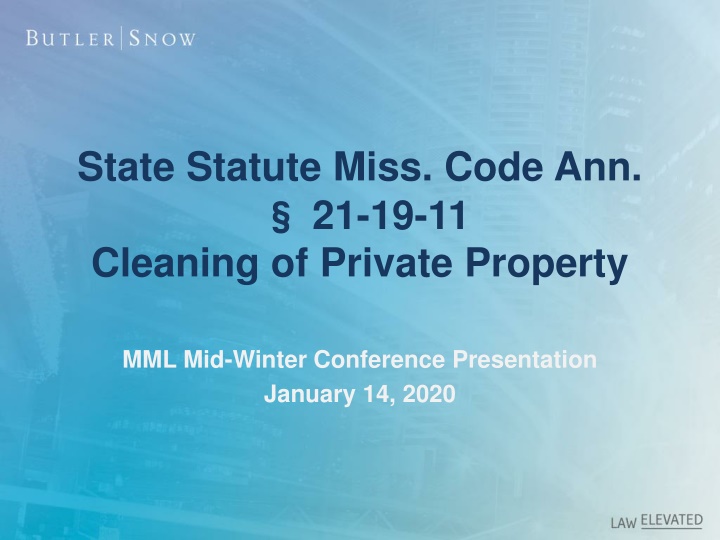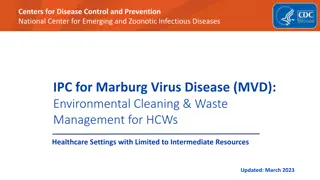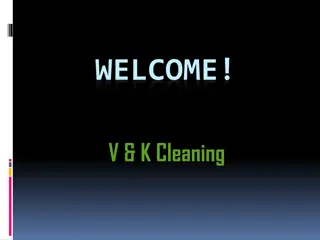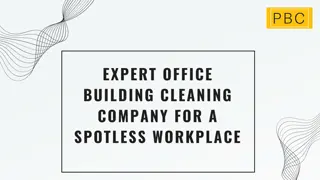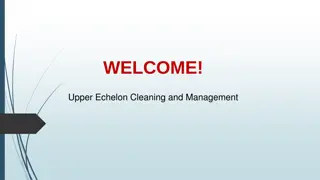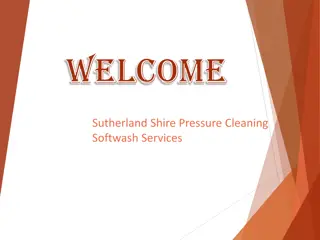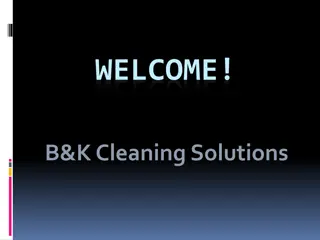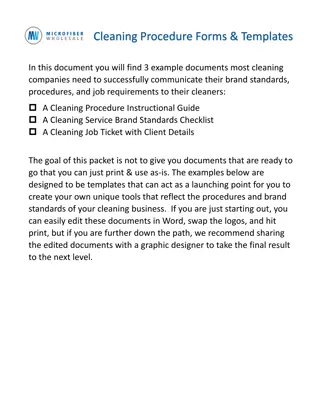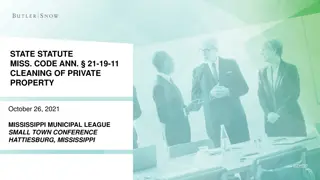State Statute - Cleaning of Private Property Overview
This presentation provides an overview of the State Statute Miss. Code Ann. 21-19-11 regarding the cleaning of private property. It includes information on the general authority to prevent a nuisance, explanation of the authority, additional cleanup statutes, and the uses of 21-19-11 by municipalities. The slides emphasize the importance of consulting an attorney for legal actions based on the content presented.
Download Presentation

Please find below an Image/Link to download the presentation.
The content on the website is provided AS IS for your information and personal use only. It may not be sold, licensed, or shared on other websites without obtaining consent from the author.If you encounter any issues during the download, it is possible that the publisher has removed the file from their server.
You are allowed to download the files provided on this website for personal or commercial use, subject to the condition that they are used lawfully. All files are the property of their respective owners.
The content on the website is provided AS IS for your information and personal use only. It may not be sold, licensed, or shared on other websites without obtaining consent from the author.
E N D
Presentation Transcript
State Statute Miss. Code Ann. 21-19-11 Cleaning of Private Property MML Mid-Winter Conference Presentation January 14, 2020
REMINDER!! These slides interpret federal and state laws as of the date that the presentation was given. Consult with an attorney prior to taking any action in reliance on these slides to ensure there have been no changes in the law or its interpretation, or otherwise. 2
State Statute Miss. Code Ann. Cleaning of Private Property 21-19-11 Overview of 21-19-11 Collecting the Cost of Cleanup Questions / Answers
Overview of Miss. Code Ann. 21-19-11
GENERAL AUTHORITY TO PREVENT A NUISANCE Property cleanup is a function of a municipality s authority to remove a public nuisance pursuant to its police power Public holds property subject to this police power There is no constitutional right to maintain a nuisance No compensation is required when a municipality eliminates a nuisance because there is no constitutional taking
EXPLANATION OF GENERAL AUTHORITY The property owner is always entitled to Due Process of Law Notice of hearing Whether the property is in fact a public nuisance
Additional Cleanup Statutes MCA 21-19-20: Demolishing Drug Houses MCA 21-19-21: Fire Prevention MCA 43-35-1 et. seq: Urban Renewal Act MCA 39-13-1 et. seq: Historic Preservation Act
Uses of 21-19-11 Process for a Municipality to perform the following on Private property: cutting grass and weeds; filling cisterns; removing rubbish, abandoned or dilapidated fences, outside toilets, abandoned or dilapidated buildings, slabs, personal property and other debris; and draining cesspools and standing water.
Scope of MCA 21-19-11 Property within City limits Commercial and Residential Undeveloped/developed property Railroads Specific area of track may be designated as in need of cleaning. Public utilities MCA 21-27-3 Historic Preservation Districts Must obtain approval of the Department of Archives prior to making any repairs pursuant to the Act. MCA 39-13-15 Does not apply to state and/or political subdivisions Must give notice to State before cleaning any parcel owned by it Limited application to 16thSection land No exemptions for elderly, charitable organizations or churches
Hearing Set by Governing Authority On its own motion; or Also has the authority to delegate setting the hearing to an administrative staff member or Mayor Upon receipt of petition from a majority of residents living within 400 feet of the property
Notice of Hearing Notice must be sent to Property Owner Notice requirements Language that informs property owner of right of re-entry Include notice in the minutes of the City Required methods of notice Mail notice 2 weeks before hearing to The address of the subject property; and The address where the ad valorem tax notice is sent Post notice 2 weeks before hearing On the property; and At City Hall or somewhere in town where such notices would be normally be posted
Who is a Property Owner Multiple Owners (Notice Required) Notice must be given to all owners of subject property. Each owner should be sent a separate notice Deceased Owners (Notice Required) Notice must be given to the owner deriving title through the deceased property owner. Mortgagees (Notice Probably Required) Consider extent of cleanup project
Who is a Property Owner Lienholders (Notice Not Required) There is no requirement that lienholders receive notice. Renters (Notice Not Required) With respect to the manner in which the governing authority should deal with the occupants of any structure to be removed under 21-19-11, the municipality must comply with notice requirements. Notice addressed to occupants may assist in notifying owner of hearing. Jones v. Flowers, 547 U.S. 220, 235 (2006) Unique information should be considered Consider unique information about an intended recipient of notice regardless of whether a statutory scheme is reasonably calculated to provide notice in the ordinary case. Jones v. Flowers, 547 U.S. 220, 230 (2006) Is the property owner in prison? Is the property owner in a nursing home? Does the property owner have a guardian? A city is accountable if it ignores information about an intended recipient
Notice by Mail Certified mail is not required Advantage of sending notice by certified mail Provides evidence of receipt of notice Advantage of sending notice by regular mail Method to quickly determine whether address is good Cheap Suggestion: Send notice by both certified mail and regular mail. Notice must be mailed to the address of the subject property regardless of the city s expectation that it will be returned undeliverable.
Posting Notice [P]osting notice on real property is a singularly appropriate and effective way of ensuring that a person . . . is actually apprised of a proceedings against him. Jones v. Flowers, 547 U.S. at 236 No particular method of posting notice on property (i.e., no size requirement, color, etc.)
How Far to Go to Ensure Notice is Proper Under Due Process Goal: To balance the rights of the property owner with efficient government City s obligation under due process to provide notice to property owner increases with the size of the cleanup project Due process requirements of giving notice are flexible Mowing grass v. tearing down a building If a city has knowledge that notice pursuant to normal procedure is ineffective, the city has an obligation to take additional steps to affect notice. Jones v. Flowers, 547 U.S. at 231 (2006) Additional steps suggested by the in Jones v. Flowers Posting notice on the property; Sending notice by both certified mail and regular mail; Sending notice addressed to occupant if the property is rented
How Far to Go to Ensure Notice is Proper Under Due Process But, due process does not require a municipality to pursue heroic efforts to achieve notice to affected parties. Dusenbery v. U.S., 534 U.S. 161, 170 (2002) Too burdensome for cities according to Jones v. Flowers Looking at income tax records for owner s address Looking in the phone book for owner s address And, the fact that notice is ineffective does not mean it is inadequate Note: Publication of the notice in a newspaper may be a problem unless the property owners are unknown Chance alone brings a person s attention to an advertisement in small type inserted in the back pages of a newspaper. Jones v. Flowers, 547 U.S. at 230 (2006)
Key Points for Notice 2 Standards of Notice to meet MCA 21-19-11 Always provide the notices in the manner and to the addresses that it requires Constitutional Due Process Whether this standard is met will be determined by facts of each case This may require more effort than required by MCA 21-19-11, i.e., sending notices to additional addresses Consider unique information The city has an obligation to provide notice based on information that it either receives or knows about a property owner Sometimes notices will fail Include all city s efforts to find property owners and to provide notice in the minutes of hearing to adjudicate the condition of the property
The Hearing Conducted by Board of Alderman/Council The purpose of the hearing is to determine whether the property is a menace to the public health, safety and welfare of the community Common interest affected rather than the interest of a particular individual Substantial evidence must be provided to conclude that reasonable minds would determine that the property is a menace. Vazzana v. Greenville, 116 So. 3d 1103, 1105 (Miss. 2013) Minutes of hearing should include: Extensive documentation and photos that supports decision. Attempts at notice. A finding that the property owner has been properly served.
The Hearing Decision may be appealed pursuant to Miss. Code Ann. 11-51-75 Ten-day period for appeal begins to run when municipality adjourns the meeting to discuss the property, not when the minutes are adopted Arbitrary, capricious or contrary to applicable law standard applies
The Cleanup Permission to enter property is not needed Work must be consistent with the resolution adjudicating that the property needs cleaning Specific cleanup allowed Cut grass and weeds Herbicides may be used to kill grass and weeds Fill cisterns Remove rubbish Remove abandoned or dilapidated fences Remove slabs See Miss. Atty. Gen. Op. 2015-00126 (May 15, 2015) Remove outside toilets Remove abandoned or dilapidated buildings Houses are considered buildings Remove personal property Reasonable precaution to prevent destruction Municipalities cannot sell abandoned personal property to offset costs Remove other debris Drain cesspools and standing water
The Cleanup Work must address the public nuisance problem and not improve, restore or landscape private property The Act does not permit a municipality to board up windows and doors to secure abandoned structures However, with approval of the Department of Archives and History, repairs can be made to buildings in historic districts. Miss. Code Ann. 39-13-15
Who Performs the Cleanup Work can be done by the city or a third party Work done by third party Bid required in some instances based on the type of project Projects to clean lots are considered a construction project and must comply with purchasing statutes Mowing is considered a service and not subject to purchasing statutes Separate bid for each project is required But, city may request unit bids for additional work if re- entry is required County may lend equipment Inmate labor may be used
Re-entry for Subsequent Cleaning Re-entry allowed 12 Month Period Re-enter 6 times Scope Remove dilapidated buildings Remove dilapidated fences Remove outside toilets Re-enter 12 times Scope Cut grass and weeds Remove rubbish Remove personal property Remove other debris 7 days notice required for each re-entry Posted on property; and At City Hall or somewhere in town where such notices would be normally be posted There is no new hearing required for each re-entry Re-entry work must be consistent with decision at the hearing adjudicating the property to be in need of cleaning
Expedited Procedure (Cutting Grass in Big Cities) Applies to >25,000 population; and <1 acre or Cost to clean <$250 Notice 7 days notice by mail; and Post Notice Hearing Officer makes adjudications Expense of cleaning property limited to no more than $250 per cleaning, plus an administrative fee of no more than $50 per cleaning May reenter property up to one year from adjudication to clean property up to 6 times Total aggregate actual cost of cleaning property may not exceed $1,000 per year 26
Cost of Cleanup Cost includes Cost of the work done either by the municipality or a third party; Administrative costs; and Legal costs Statutory Limits on Cost Greater of $20,000 per calendar year; or Fair market value of the property Limitation refers only to the cost of cleaning and does not include any penalty Hazardous waste cleanup is not part of the cost limit Penalty Greater of Not to exceed $1500; or Not to exceed 50% of the actual cost of the cleanup May be assessed each time the municipality re-enters property Municipality must adjudicate the cost of cleaning at a meeting and at that time assess the penalty
Required Steps for Adjudication of Cost Prepare all cost data in Invoice Form Municipality should adopt a resolution Adjudicating the cost of cleaning May impose a statutory penalty fee Determine how to collect Give the owner a chance to pay Authorize the institution of a civil suit to collect the debt and/or file a lien against the property
Collecting Cleanup Costs in a Civil Suit Suit on an open account (MCA 11-53-81) Filed against the property owner Demand letter required at least 30 days prior to filing suit Municipality is entitled to recover court costs, reasonable attorney s fees and interest from the date the property was cleaned Judgment lien filed against property owner in all counties that property owner owns property
Collecting Cleanup Costs as an Assessment Lien Enroll the resolution adjudicating the cost of cleanup with the Circuit Clerk If a municipality is located in two counties file the lien in the county where the property is located The lien only applies to the property that has been cleaned State and local tax liens have priority over assessment liens Options of a City once a lien is filed Liens may be forgiven by city pursuant to Miss. Code Ann. 21-19-12 for non-profits and for-profit developers; or Municipality may direct tax collector to sell property
Lien Amnesty Pursuant to MCA 21-19-12 MCA 21-19-11 liens may be forgiven by city pursuant to MCA 21-19-12 Property must be purchased by a Nonprofit 501(c)(3) organization; or a For-profit developer who purchases property considered blighted to convert the property to productive use Lien must have been in existence for 2 years Purchaser must apply to the city for lien amnesty The purchaser must convert the property from its blighted state within 18 months (can be extended up to an additional 12 months)
